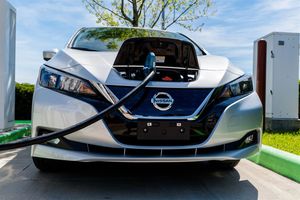Vietnam, with its high energy demand and rapid growth, faces rising greenhouse gas (GHG) emissions, while urbanization and infrastructure expansion strain its natural ecosystems.
A World Bank 2025 report projects that under the RCP4.5 scenario, climate change could slash Vietnam's GDP by 9.1% by 2035 and 12.5% by 2050. The severity is already evident: in just the first ten months of 2025, Vietnam endured 20 unusually intense natural disasters, costing an estimated VND 59.2 trillion (USD 2.25 billion) in damages.
Despite these challenges, Vietnam has emerged as a regional forerunner in climate action. To deliver on its landmark COP26 commitment to achieve Net Zero emissions by 2050 – a pledge that now anchors its long-term sustainable development strategy – Vietnam has rolled out a suite of robust policies. These include the National Climate Change Strategy to 2050, the decree on GHG Emission Reduction and Ozone Layer Protection (No. 06/2022/ND-CP), the updated decree 119/2025/ND-CP, a National Methane Action Plan, and a blueprint for a domestic carbon market. These frameworks focus on promoting renewable energy, enhancing energy efficiency, and managing waste and emissions across key sectors.
Notable Achievements
- Energy Transition: Vietnam is rapidly greening its power grid. In Q1 2025, renewables accounted for 16% of total electricity output, with hydropower contributing a further 19.1%, positioning Vietnam among Asia's fastest-moving nations in clean energy adoption. The revised National Power Development Plan (PDP VIII) prioritizes maximising renewable sources like wind, solar, and biomass, while also encouraging newer technologies like waste-to-energy and geothermal.
- Policy & Institutional Innovation: Vietnam is building a comprehensive legal and market foundation for its transition. Reforms are creating conditions for robust power purchase agreements, efficient pricing, and grid investment. A pilot program for allocating emission quotas and carbon credits in the electricity sector is a critical step, designed to mobilise carbon finance and spur technological innovation.
- International Partnership: As a member of the Just Energy Transition Partnership (JETP), Vietnam has secured an initial mobilisation package of USD 15.5 billion. Under this framework, Vietnam aims to peak power sector emissions at 170 million tCO2e by 2030 and source at least 47% of its electricity from renewables. Collaboration is advancing, with 44 JETP-linked projects, representing over USD 10 billion in capital demand, currently under consideration.
Persisting Challenges on the Path to Net Zero
- Financing Gap: The World Bank estimates Vietnam needs an additional USD 368 billion in investment by 2040 to meet its climate goals. PDP VIII alone requires an estimated USD 135 billion by 2030. Mobilising this scale of capital from public, private, and international sources is a paramount challenge.
- JETP Implementation Hurdles: While progress is being made, the pace of JETP implementation remains slower than desired. Delays are often due to the complexity of large-scale projects and a need for clearer guidance from international partners on procedures and financial incentives.
- Technological Capacity: Vietnam's domestic research and development (R&D) capacity in advanced fields like advanced renewables, carbon capture, and waste treatment remains limited, remains a challenge.
- Nascent Carbon Market & Industrial Transition: Developing a fully functional carbon market is a long-term endeavor. Simultaneously, many businesses are new to GHG inventories and lack the capital for the necessary technological transformation.
- Balancing Growth and Transition: Vietnam's economy is still reliant on fossil fuels and export-oriented industries, creating inherent tension between immediate development needs and the long-term green transition.
A Call for Enhanced International Cooperation
Vietnam has demonstrated serious commitment through its policies and actions. It stands ready to be a reliable, transparent, and science-driven partner. However, to accelerate a just and inclusive green transition, strong international support is essential — not just as a matter of Common But Differentiated Responsibilities (CBDR), but as a strategic investment opportunity. Support in finance, technology transfer, and governance will be key to unlocking Vietnam's potential to achieve Net Zero by 2050, protecting its people and ecosystems while fostering sustainable growth and inspiring just transitions worldwide.
Hashtag: #MAE
The issuer is solely responsible for the content of this announcement.





